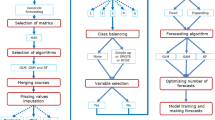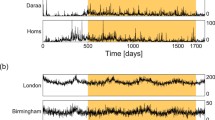Abstract
Large volume, data-driven violent conflict research is now possible using publicly available data sets. This work analyzes the predictive ability of data-derived Gaussian process models compared to a generalized linear model. Societal violence is a highly nonlinear process and the available data sets have high dimensionality that yield observation totals in the hundreds of thousands to millions. These challenges make machine learning modeling difficult without significant dimensionality reduction. We develop a computationally intensive Gaussian process modeling approach that exploits the size and complexity of the violent conflict dataset to identify appropriate basis vectors for the model. We develop our models using gridded monthly violent event counts for sub-Saharan Africa from 1980 to 2012. Our resulting Gaussian process models modestly improve the accuracy and predictive ability of existing generalized linear models. Despite this improvement, the accurate prediction of violence in sub-Saharan Africa at a relatively fine resolution spatial grid of 1 \(^\circ\) latitude/longitude remains a challenging problem.






Similar content being viewed by others
References
Bogomolov, A., Lepri, B., Staiano, J., Oliver, N., Pianesi, F., & Pentland, A. (2014). Once upon a crime: Towards crime prediction from demographics and mobile data. In Proceedings of the 16th international conference on multimodal interaction, ICMI ’14 (pp. 427–434). ACM, New York. https://doi.org/10.1145/2663204.2663254.
Carl Edward, R., & Williams, C. K. (2006). Gaussian processes for machine learning. Cambridge: MIT.
Damianou, A. C., & Lawrence, N. D. (2013). Deep Gaussian processes. International Conference on Artificial Intelligence and Statistics, 31, 207–215. https://doi.org/10.1002/nme.1296.
Flaxman, S.R. (2014). A general approach to prediction and forecasting crime rates with Gaussian processes. Ph.D. thesis, Carnegie Mellon University.
Flaxman, S.R., Wilson, A.G., Neill, D.B., Nickisch, H., Smola, A.J. (2015). Fast Kronecker inference in gaussian processes with non-gaussian likelihoods. In Proceedings of The 32nd international conference on machine learning (vol. 37, pp. 607–616).
Gerber, M. S. (2014). Predicting crime using twitter and kernel density estimation. Decision Support Systems, 61, 115–125.
Hegre, H., Metternich, N. W., Nygård, H. M., & Wucherpfennig, J. (2017). Forecasting in peace research. Journal of Peace Research, 54(2), 113–124. https://doi.org/10.1177/0022343317691330.
O’Loughlin, J., Linke, A. M., & Witmer, F. D. (2014). Effects of temperature and precipitation variability on the risk of violence in sub-Saharan Africa, 1980–2012. Proceedings of the National Academy of Sciences, 111(47), 16712–16717.
O’Loughlin, J., Witmer, F. D. W., Linke, A. M., Laing, A., Gettelman, A., & Dudhia, J. (2012). Climate variability and conflict risk in East Africa, 1990–2009. Proceedings of the National Academy of Sciences of the United States of America, 109(45), 18344–18349.
Raleigh, C., Linke, A., Hegre, H., & Karlsen, J. (2010). Introducing ACLED: An armed conflict location and event dataset special data feature. Journal of Peace Research, 47(5), 651–660.
Rasmussen, C. E., & Nickisch, H. (2010). Gaussian processes for machine learning (GPML) toolbox. Journal Machine Learning Research, 11, 3011–3015.
Salakhutdinov, R., & Hinton, G. (2008). Using deep belief nets to learn covariance kernels for Gaussian processes. Advances in Neural Information Processing Systems, 20(20), 1–8.
Salehyan, I., Hendrix, C. S., Hamner, J., Case, C., Linebarger, C., Stull, E., et al. (2012). Social conflict in Africa: A new database. International Interactions, 38(4), 503–511. https://doi.org/10.1080/03050629.2012.697426.
Snelson, E., Ghahramani, Z.: Variable noise and dimensionality reduction for sparse Gaussian processes (2012). arxiv: 1206.6873.
Sundberg, R., & Melander, E. (2013). Introducing the UCDP georeferenced event dataset. Journal of Peace Research, 50(4), 523–532. https://doi.org/10.1177/0022343313484347.
Themner, L., & Wallensteen, P. (2013). Armed conflicts, 1946–2012. Journal of Peace Research, 51(4), 541–554. https://doi.org/10.1177/0022343314542076.
Wang, T., Rudin, C., Wagner, D., & Sevieri, R. (2013). Learning to detect patterns of crime. Joint European conference on machine learning and knowledge discovery in databases (pp. 515–530). Berlin: Springer.
Wilson, A., & Adams, R. (2013). Gaussian process kernels for pattern discovery and extrapolation. Proceedings of the 30th International Conference on Machine Learning, 28(3), 1067–1075.
Wilson, A. G., Dann, C., & Nickisch, H. (2015). Thoughts on massively scalable Gaussian processes. EMNLP,. https://doi.org/10.7153/mia-18-96.
Wilson, A. G., & Nickisch, H. (2015). Kernel interpolation for scalable structured Gaussian processes (KISS-GP). International Conference on Machine Learning, 37, 1–19.
Witmer, F. D., Linke, A. M., O’Loughlin, J., Gettelman, A., & Laing, A. (2017). Subnational violent conflict forecasts for sub-Saharan Africa, 2015–65, using climate-sensitive models. Journal of Peace Research, 54(2), 175–192.
Zammit-Mangion, A., Dewar, M., Kadirkamanathan, V., & Sanguinetti, G. (2012). Point process modelling of the Afghan war diary. Proceedings of the National Academy of Sciences, 109(31), 12414–12419. https://doi.org/10.1073/pnas.1203177109.
Author information
Authors and Affiliations
Corresponding author
Rights and permissions
About this article
Cite this article
Kupilik, M., Witmer, F. Spatio-temporal violent event prediction using Gaussian process regression. J Comput Soc Sc 1, 437–451 (2018). https://doi.org/10.1007/s42001-018-0024-y
Received:
Accepted:
Published:
Issue Date:
DOI: https://doi.org/10.1007/s42001-018-0024-y




